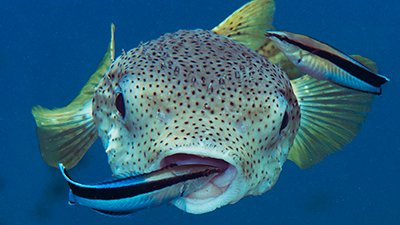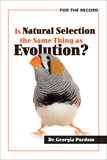Natural Selection in Guppies
Guppies are among the most well-known of aquarium fishes. They come in a vast array of patterns and colors and are wildly popular among dedicated aquarists thanks to their colors and the ease of breeding them. However, because of where they are found in the wild, guppies have been extensively used as model organisms for evolutionary biologists. Evolutionists have claimed that guppies are an excellent example of natural selection and evolution. However, there is much to carp about in their interpretations of natural selection in guppies.
Because of their isolation, guppy populations have been used to study the processes of “evolution” in the wild.
Guppies have some major advantages when it comes to using them as a model organism for evolutionary biology. They are small fish that sexually mature in just six weeks.1 They are found in isolated pools in rivers and streams throughout their native habitat, making them ideal for examining the variation between populations. When they are studied, the studies occur almost exclusively in Trinidad because guppies’ other natural habitats are either too isolated, unsuited for study or too difficult for outside scientists to access.2 Because of their isolation, guppy populations have been used to study the processes of “evolution” in the wild. These guppies have been used as model organisms for evolution since at least the 1970s.3
Predation
By far the most studied aspect of guppy evolution is the evolution of guppies’ interaction with predators, generally killifish and cichlid. The killifish preys periodically on juvenile guppies, or fry, while the cichlid will happily gulp down adult guppies.4 The guppies who live in the presence of killifish are considered to live in a low-predation environment, while those that live in the presence of the cichlid are considered to live in a high-predation environment. Unsurprisingly, those in a high predation environment mature sooner and produce more offspring more frequently than those in low-predation environments. This reproduction is expected, for the guppy population is adapting to its surroundings.
One such study modeled the change that occurred in a guppy population when it was exposed to different predators. The researchers moved guppies from a high-predation environment to a low-predation environment. In just eleven years (20–40 generations of guppies), the population had adapted to its environment. The guppies in low predation environments matured more slowly than their high-predation cousins and gave birth less often. They also gave birth to fewer offspring, but these offspring were larger than in high predation pools.5 Guppies from a high-predation environment also show a much better ability to evade predators than their cousins from a low-predation environment.6 Both of these changes are heritable through at least two generations. However, another paper pointed out that, after two generations, environmental conditioning is lost in guppies, so this conditioning does not appear to be genetically based.7
Resources
Predation did not appear to be the only factor influencing the guppies. In fact, one study found that the strongest influence on guppy growth rates was the availability of the algae they feed on in the wild.8 However, as this paper only examined low-predation sites and not sites with higher predation, it remains unclear whether this finding would hold true in areas where cichlids are active. It does indicate, though, that the predator/prey relationships may have been overemphasized in the literature.
A 2019 study sought to test whether guppies were adapting to the lack of predators or to the increase in population density in low predation pools. The researchers moved guppies from high predation populations to areas which previously had lacked guppies but also lacked the cichlid predators. The result mirrored the low predation streams with larger guppies, maturing later and giving birth to fewer larger offspring within three years.9 Given past experiments where high-predation guppies have been moved to low-predation areas, this result is hardly surprising.
Worldview
What is surprising is the repeated misuse of the word evolution to characterize these changes.
What is surprising is the repeated misuse of the word evolution to characterize these changes. The authors of these papers are all professional scientists writing in peer-reviewed scientific journals, yet they all repeatedly equivocate on the word evolution: “Adaptation, or the process of evolution by natural selection, was the cornerstone of Darwin’s proposed mechanism for evolutionary change and remains the most widely accepted mechanism responsible for phenotypic evolution.”10 Notice in this quote how closely the authors equate adaptation with Darwinian evolution. Other authors equate natural selection with evolution.11 “Our work cannot address the efficacy of mechanisms other than natural selection, but it extends our understanding of what is attainable through this process. It is part of a growing body of evidence that the rate and patterns of change attainable through natural selection are sufficient to account for the patterns observed in the fossil record.”12 In these authors minds, natural selection in guppies is the driver of their evolution.
Naturally, Selection
The examples of changes in these populations are indeed fine examples of natural selection in guppies. The guppies are being influenced by the environmental conditions around them, and the guppy population is responding according by maturing earlier or later, producing variable sized fry and so on. But “natural selection is not evolution” is a truth that has been known and repeated correctly since the early 1900s, even by evolutionists!13 In fact, perhaps the premier expert on natural selection in the 20th century, George Williams, wrote, “I regard it as unfortunate that the theory of natural selection was first developed as an explanation for evolutionary change. It is much more important as an explanation for the maintenance of adaptation.”14 Natural selection, according to Williams, was not the primary mechanism of evolutionary change: it simply maintained existing diversity. Williams also had strong words for those using natural selection to support their arguments for evolution. Discussing the problems evolutionists have with adaptation, Williams prophetically wrote in the 1970s, “One (problem) is that a biologist can make any evolutionary speculation seem scientifically acceptable merely by adorning his arguments with the forms and symbols of the theory of natural selection.”15
The idea that natural selection is the agent of evolution, as conveyed in the guppy evolution story, simply does not work. In all the extensive research done on guppies over the past few decades, researchers have not produced any new kinds of organisms. They have not even produced a new species as a result of their manipulation of the guppy populations in the wild.16 They have simply demonstrated the action of natural selection in guppies in the wild, something creationists have no problem with.
All Wet
In fact, as Dr. Jason Lisle points out, the Bible records examples of natural selection. Noah’s flood was perhaps the best such example.17 This flood, while a supernatural event, had vast consequences on the natural world. The Bible tells us that all land-dwelling, air-breathing animals died as a result of the flood, save those aboard the Ark (Genesis 7:21–23). That did not include fish, since fish live in water already. Most were more than capable of surviving in the floodwaters. Fish survived because they were better adapted to the changed environment than land animals were.
Just as evolutionists accept natural selection, so do creationists. The difference is in what each believes natural selection can do.
Just as evolutionists accept natural selection, so do creationists. The difference is in what each believes natural selection can do. To the evolutionist, any change by means of natural selection is evolution and purported to be demonstrative of the progression of chemicals to chemists. To the creationist, changes as a result of natural selection are the result of variation within the created kind. Guppies are indeed a good model of natural selection, which can change traits in population—traits such as size, reproductive timing, and so on. However, natural selection cannot turn a guppy into another type of fish. Evolving requires power natural selection simply does not have. There are no models of Darwinian evolution since changes outside basic kinds have never been observed.
Footnotes
- David N. Reznick and Cameron K. Ghalambor, “Can Commercial Fishing Cause Evolution? Answers from Guppies (Poecilia reticulata)” Canadian Journal of Fisheries and Aquatic Sciences 62, no. 4 (2005): 791–801, https://www.nrcresearchpress.com/doi/pdf/10.1139/f05-079.
- Anne E. Magurran, “Sexual Conflict and Evolution in Trinidadian Guppies” Genetica 112, no. 1 (2001): 463–474, https://link.springer.com/article/10.1023/A:1013339822246.
- James A. Farr, “The Role of Predation in the Evolution of Social Behavior of Natural Populations of the Guppy, Poecilia Reticulata (Pisces: Poeciliidae)” Evolution 29, no. 1 (1975): 151–158, https://onlinelibrary.wiley.com/doi/pdf/10.1111/j.1558-5646.1975.tb00822.x.
- David N. Reznick and John A. Endler, “The Impact of Predation on Life History Evolution in Trinidadian Guppies (Poecilia reticulata)” Evolution 36, no. 1 (1982): 160–177, https://onlinelibrary.wiley.com/doi/pdf/10.1111/j.1558-5646.1982.tb05021.x.
- David N. Reznick et al., “Life-History in Guppies (Poecilia reticulata) 6. Differential Mortality as a Mechanism for Natural Selection” Evolution 50, no. 4 (1996): 1651–1660, https://onlinelibrary.wiley.com/doi/pdf/10.1111/j.1558-5646.1996.tb03937.x.
- Shyril O’Steen, Alistair J. Cullum, and Albert F. Bennett, “Rapid Evolution of Escape Ability in Trinidadian Guppies (Poecilia reticulata)” Evolution 56, no. 4 (2002): 776–784, https://onlinelibrary.wiley.com/doi/pdf/10.1111/j.0014-3820.2002.tb01388.x.
- David N. Reznick et al., “Effect of Extrinsic Mortality on the Evolution of Senescence in Guppies” Nature 431 (2004): 1095–1099, https://faculty.ucr.edu/~gupy/Publications/Nature2004.pdf.
- Gregory F. Grether et al., “Rain Forest Canopy Cover, Resource Availability and Life History Evolution in Guppies” Ecology 82, no. 6 (2001): 1546–1559, https://sites.lifesci.ucla.edu/eeb-gretherlab/wp-content/uploads/sites/146/2017/07/Grether-et-al-2001-Ecology.pdf.
- David N. Reznick et al., “Eco-Evolutionary Feedbacks Predict the Time Course of Rapid Life-History Evolution” The American Naturalist 194, no. 5 (2019), https://www.journals.uchicago.edu/doi/pdfplus/10.1086/705380.
- Cameron K. Ghalambor, David N. Reznick, and Jeffrey A. Walker, “Constraints on Adaptive Evolution: The Functional Trade-Off between Reproduction and Fast-Start Swimming Performance in the Trinidadian Guppy (Poecilia reticulata)” The American Naturalist 164, no. 1 (2004): 38–50, https://digitalcommons.usm.maine.edu/cgi/viewcontent.cgi?article=1008&context=bio-faculty
- Reznick et al., “Effect of Extrinsic Mortality on the Evolution of Senescence in Guppies,” 1095–1099.
- David Reznick et al., “Evaluation of the Rate of Evolution in Natural populations of Guppies (Poecilia reticulata)” Science 275 (1997): 1934–1937, http://www.bio.miami.edu/dana/160/workshop/reznick_97.pdf.
- Ronald A. Fisher, The Genetical Theory of Natural Selection (New York: Dover Publications, 1958), vii.
- George C. Williams, Adaptation and Natural Selection (Princeton: Princeton University Press, 1972), 54.
- Williams, Adaptation and Natural Selection, 21.
- Of note, the guppy species in Trinidad were separated into two species in 2009 independently of the evolutionary studies discussed here, though one of the authors of the aforementioned studies did contribute to their work. See Susanne Schories, Manfred K. Meyer, and Manfred Schartl, “Description of Poecilia (Acanthophacelus) obscura n. sp., (Teleostei: Poeciliidae), a New Guppy Species from Western Trinidad, with Remarks on P. wingei and the Status of the ‘Endler’s Guppy’” Zootaxa 2266, no. 1 (2009): 35–50, https://www.mapress.com/zootaxa/2009/f/zt02266p050.pdf.
- Jason Lisle, “Refuting Dubious Claims Regarding Natural Selection” Answers Research Journal 11 (2018): 301–340, https://answersingenesis.org/natural-selection/refuting-dubious-claims-regarding-natural-selection/.
Recommended Resources

Answers in Genesis is an apologetics ministry, dedicated to helping Christians defend their faith and proclaim the good news of Jesus Christ.
- Customer Service 800.778.3390
- © 2024 Answers in Genesis






